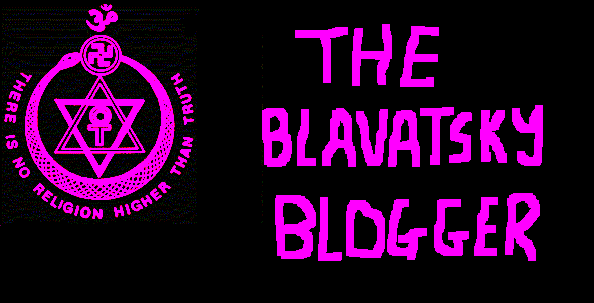Blavatsky Blogger

Taking Theosophical
ideas
into the 21st
century

Rethinking
the Role of the Family
in
Spiritual Evolution.
Time
was, when being born into a family was
often
like joining the crew under the command
of
a captain who ran a very tight ship.
Family
membership entailed obedience,
responsibilities
and loyalty.
This
structure is now rare in our society
and
modern replacements are more fluid
and
less clearly defined.
What
has been lost and what benefits do the new
structures
offer in the quest for Spiritual Growth ?
Posted
21/1/07
In 1911 C
Jinarajadasa described the purpose of the family as “a meeting-place of souls
to help each other towards perfection.” (Practical Theosophy).
He also
went on to describe the role of the family as a platform for development;
“The
family is not a meeting-place of simple travellers who meet for a few brief
years, and then go their separate ways in eternity; it is far
more a
theatre or concert hall where a drama or a composition is being rehearsed, so
that all the individuals may learn to perform their parts with
beauty and
dignity for the delight of man and of God.”
As a high
caste Indian, C Jinarajadasa draws his experience of families from structures
akin to those of Biblical times. He describes the family unit as hierarchical
with elders in charge and including servants and domestic animals as family
members. He avoids the subject of arranged marriages.
The
traditional family unit recognizable to us would not include servants although
many regard their pets as family members. However, like the one described by
Jinarajadasa, our traditional family would be presided over by a dominant male
figure who commanded considerable respect and moral authority.
Another
familiar model was that of the extended family with members of three or even
four generations living under one roof. Authority would be more negotiable but
would lie with the older members of the family and was often ruled by one
dominant senior member.
There is a traditional
family described by Annie Besant in the posting on Family Karma
in which the family is almost a dynastic arrangement with its
own subculture and traditions.
These
models described provided a secure, stable, and in ideal circumstances, a
supportive environment in which to grow up. Considerable wisdom drawn from life
experience could be handed down the generations and one could often find, or
was allocated, a niche for oneself as a valuable family member. This is
positive both Spiritually and Karmically.
Jinarajadasa
says;
“He has a
definite role in the family, and his
growth as
a soul is by playing that role to the fullness of his capacity.”
Unfortunately
these structures could impose a rigid and totalist environment in which growth
and education were replaced by programming and knocking into shape. A blueprint
for your life could be handed down like a sentence from the older generation
which determined your religion, moral values and social attitudes. It used to
be common for people to say “I was always brought up to believe this” often
with no reference to whether they ever questioned it.
Communications
and the availability of information have played a big part in the demise of the
rigidly controlled family. A significant factor in the past was that before
radio and television, it was easier for a senior dominant family member to
control and regulate any outside influences on the children of the household.
The
introduction of television in particular probably influenced parents as much as
it influenced children although it was always children who were accused of
“watching too much television”. A parent who forbade his children to read any
comic other than the Eagle or buy fizzy drinks and rationed television watching
to narrow specific times must seem a historical curiosity in an age when five
year olds send emails and have mobile phones.
Most
traditional family upbringings were probably not as oppressive as described
above but the fact still remained that opportunities for self realization and
growth were determined by your elders with a level of coercion. To break with
family tradition or values was often difficult and could mean separation or
distancing from an otherwise supportive family unit. Nowadays, the “Black
Sheep” of the family seems to be an endangered species.
The
traditional family could also provide a comfort zone in terms of development
which it may be difficult to grow away from. Being comfortable with the ideas
of one upbringing is an easy option. Why try harder?
Let me
make it clear that in exploring the pluses and minuses of family structures, I
am not talking about dysfunctional and problem families in which drugs, alcohol
abuse and violence distort any opportunity for growth. These fall outside the
scope of this posting.
When it comes
to influence the family has on an individual’s spiritual growth, Jinarajadasa
made a statement which could be applied to any family arrangement, although
this was probably not his intention in 1911;
“He takes
birth in a particular family because its environment is both what he deserves
and that from which he can get the experiences he needs for his growth.”
Things
have certainly changed in the West since he wrote this and the change for most
has been a liberation.
There
seems now to be no standard family format with related people living in various
paradigms and more single occupancy households than family households. The
actual act of marriage itself has become optional even when having children and
remaining single with no children has become a common lifestyle decision for
both sexes. The status of women is unrecognizable from that of 50 years ago
when they were hardly independent citizens in their own right. We have come a long way since we spoke about
spinsters “being left on the shelf” and the jibe “not married at your age?”
which was aimed both at men and women, sank without trace in the sixties.
The old
certainties have more or less gone and the support and security of the
traditional family has in some cases been replaced by the welfare system. This
has left a lot of people feeling isolated in a world where technology means
that you hardly need to interact with anyone, if you choose not to do so. It
has also enabled many to negate any responsibility for their children although
there have always been those who have done this.
To someone
brought up in the traditional family era, the idea of a loose knit fluid family
structure in which a mother has three children with different fathers (just an
example) is often quite frightening.
Structures
such as this can be just as supportive as the traditional family and without
imposition by a single dominant figure can offer the individual an opportunity
for spiritual growth on their own terms.
Clearly
defined family roles are no longer provided automatically or imposed by the
family and this is also true in most two parent families. The child has a
chance to create their own space and find their own level as a useful family
member. There are many competing influences on a child and the risk of rigid conformity
or programming imposed from above is now remote.
Jinarajadasa’s
phrase “the experiences he needs for his growth.” suggests that growth
automatically will take place but he describes an ideal situation and he must
have been aware of the limitations of the family, as he knew it, in this area.
He also
comments of the potential for Spiritual Growth of the child and that the child
may come into incarnation more advanced than the parents;
“It is
only as regards the body of the child that the parents are the elders; but the
child, as a soul, is the equal of the parents, and sometimes is wiser, more
capable, and more evolved than they.”
I
postulate that the change in family structures in the West has been the result
of a greater need for individual’s coming into incarnation to find expression
and self realization. This has led over the last 50 years to more
experimentation and some trial and error, which is still continuing. This may
mean that many of those born in this era will experience an acceleration in
Spiritual Growth during their incarnation.
______________________
The Blavatsky
Blogger
Taking Theosophical
ideas
into the 21st
century
__________________________
Postings
to this Website reflect
the
views of The Blavatsky Blogger.
Please
don’t go looking for anyone else.

